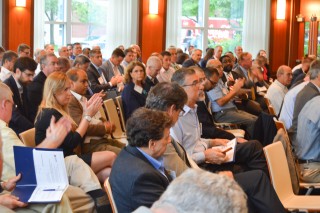Strategic Studies
The Department of Homeland Security (DHS) has requirements for future scanners that include a larger number of threat categories, higher probability of detection per category, lower false alarm rates and lower operating costs. One tactic that DHS is pursuing to achieve these requirements is to create an environment where the capabilities and capacities of the traditional vendors of security systems could be augmented by the development of algorithms by third parties. Examples of third parties include academics, national laboratories and companies other than the incumbent vendors.
DHS is particularly interested in following the model used by the medical imaging industry, in which university researchers have developed numerous algorithms that have eventually been deployed in commercial medical imaging equipment.
In order to stimulate third party algorithm development, ALERT has held workshops addressing the research opportunities that may enable the development of next generation algorithms for Homeland Security applications.
These workshops have successfully fostered interaction between third parties and vendors, reducing barriers to their working together, now and in the future. They have also directly led to increased third party involvement in the development of advanced reconstruction algorithms. These successes are based on anecdotal evidence of the number of third parties engaging in discussions with vendors during the workshops and the knowledge of third parties consulting for the vendors.
An outcome from the workshops is the recommendation to execute projects, denoted initiatives, in which third parties can work on specific problems. Three initiates have either been completed or are in process to date. The initiatives are for segmentation of CT images, reconstructing CT images and developing automated threat recognition (ATR) algorithms.
The final reports for the workshops and the initiatives are available at: final-reports.
ADSA Workshops
ALERT has also developed the “Advanced Development for Security Applications (ADSA).” workshop series. Additional information on each workshop can be found on the ADSA Workshop page.
Selected presentations, posters and final reports for the ADSA Workshops can be found online at:
https://alert.northeastern.edu/transitioning-technology/adsa/final-reports-and-presentations/
Task Orders
Task Order presentations and final reports can be found online at: www.northeastern.edu/alert/transitioning-technology/task-orders
 Researchers and Industry attend ADEPT 02
Researchers and Industry attend ADEPT 02
The second workshop on Advanced Developments Encompassing Processes and Technologies for Customs and Border Protection (CBP-ADEPT-02) was held on July 17-18, 2019, at Northeastern University.
Innovation Fast Track
EXCLUSIVE TO CENTER MEMBERS: Log in to explore your Innovation Fast Track, an online portal that gives you one-stop access to center researchers, funding opportunities, exclusive events and more.
Learn MoreStudent Central
Students, get connected with Industry Partners, find out about research and volunteer opportunities within ALERT, or get advice on how to best showcase your work at Student Central.
Learn MoreThe Partnership
ALERT is led by Northeastern University (NEU) and includes three key academic strategic partners: Boston University, Purdue University, and University of Rhode Island (URI).
Learn More